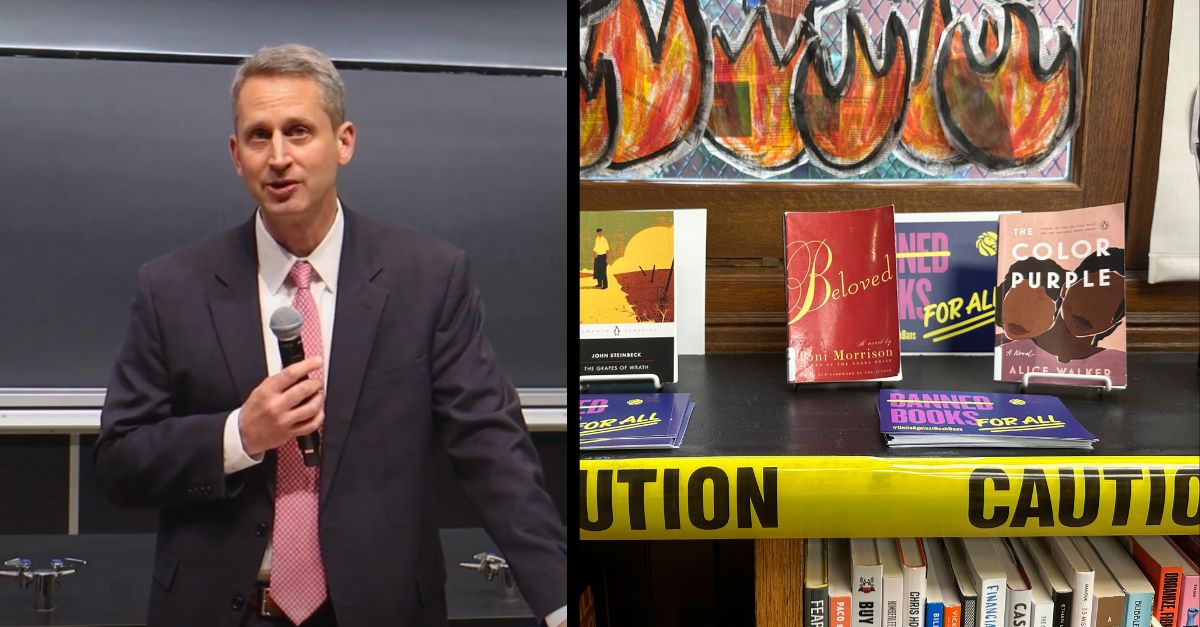
Left: U.S. Circuit Judge Kyle Duncan gives a speech called "Free Speech and Legal Education in our Liberal Democracy" (screengrab via YouTube). Right: A Banned Books Week display is at the Mott Haven branch of the New York Public Library in the Bronx borough of New York City on Saturday, October 7, 2023. (AP Photo/Ted Shaffrey).
Judges on a conservative appellate court sparred on the pages of their opinions over whether a number of controversial books should be put back on the shelves of a Texas library.
The U.S. Court of Appeals for the Fifth Circuit ruled Thursday that library patrons have a First Amendment right to have "butt and fart" books, as well as those with themes of LGBTQ+ and racism issues, to be reshelved.
In 2021, three Llano residents complained to the library about "pornographic and overtly sexual books in the library's children's section," and said they were concerned about several books about "butts and farts." The library is under the supervision of the County's Commissioners Court, which is led by Judge Ron Cunningham. Cunningham ordered library director Amber Milum to remove the books from the shelves. Shortly thereafter, Cunningham expanded his directive to include the removal of all books that "depict any type of sexual activity or questionable nudity."
As a result, the following were removed from the shelves, according to the ruling:
- Seven "butt and fart" books, with titles like I Broke My Butt! and Larry the Farting Leprechaun;
- Four young adult books touching on sexuality and homosexuality, such as Gabi, a Girl in Pieces;
- Being Jazz: My Life as a (Transgender) Teen and Freakboy, both centering on gender identity and dysphoria;
- Caste and They Called Themselves the K.K.K., two books about the history of racism in the United States;
- Well-known picture book, In the Night Kitchen by Maurice Sendak, which contains cartoon drawings of a naked child;
- and It's Perfectly Normal: Changing Bodies, Growing Up, Sex and Sexual Health.
A group of library patrons sued and the district court issued a preliminary injunction, ordering the library to return the books to the shelves and cease removing any more books from circulation during the pendency of the lawsuit. The court found that the plaintiffs were likely to succeed in proving that the library's action constituted viewpoint discrimination.
The defendants appealed and a three-judge panel of the most conservative appellate court in the nation ruled 2-1 to uphold most of the injunction.
U.S. Circuit Judge Jacques L. Wiener, a George H.W. Bush appointee, penned the majority opinion in which he said the district court came to the reasonable conclusion that the books' removal had been inappropriate. A George W. Bush appointee — U.S. Circuit Judge Leslie H. Southwick — concurred, but found that the library may remove three of the books at issue.
U.S. Circuit Judge Stuart Kyle Duncan, a Donald Trump appointee, saw things differently and was not afraid to tell his colleagues how wrong they were in their ruling.
"The commission hanging in my office says 'Judge,' not 'Librarian,'" Duncan began. "Imagine my surprise, then, to learn that my two esteemed colleagues have appointed themselves co-chairs of every public library board across the Fifth Circuit."
Duncan said he did not doubt his fellow judge's "good intentions," but said that their ruling was "a disaster" that "lack[s] any basis in law or common sense."
"And applying them will be a nightmare," Duncan predicted.
Duncan said that a library's decision as to which books to shelve constitutes "government speech" and derided the majority's decision as "jurisprudential inanity."
"What a train wreck," Duncan wrote of the majority's ruling. "Imagine if a library had to feature books of all viewpoints."
"Alongside history books, it would have to shelve conspiracy theories," warned the Trump appointee who once described a key same-sex marriage decision as a threat to "civic peace."
"You've heard of the Soup Nazi? Say hello to the Federal Library Police," the 51-year old Duncan wrote, referencing two well-known comedic characters from "Seinfeld," the latter of which has roots in a Stephen King novel.
"Stephen King saw this coming," Duncan wrote. "One of his scary stories once warned: 'AVOID THE LIBRARY POLICE!'"
"Now, thanks to the majority, we are all the Library Police," Duncan lamented.
In his majority decision, 89-year old Weiner addressed his dissenting colleague's "Library Police" reference, arguing that King himself would likely have agreed with the court's decision.
Weiner wrote:
The dissent accuses us of becoming the "Library Police," citing a story by author Stephen King. But King, a well-known free speech activist, would surely be horrified to see how his words are being twisted in service of censorship. Per King: "As a nation, we've been through too many fights to preserve our rights of free thought to let them go just because some prude with a highlighter doesn't approve of them." Defendants and their highlighters are the true library police.
Conservative states have increasingly looked to book bans to advance various agenda items — with some even putting criminal penalties on the table for the noncompliant. By contrast, other states have adopted statutes that specifically disallow book bans.
Book bans in public libraries, including school libraries, necessarily raise First Amendment issues. While a 1982 Supreme Court ruling found that a public school board's content-based book ban violated the First Amendment, the decision left the precise legalities largely unclear.
You can read the court's full ruling here.